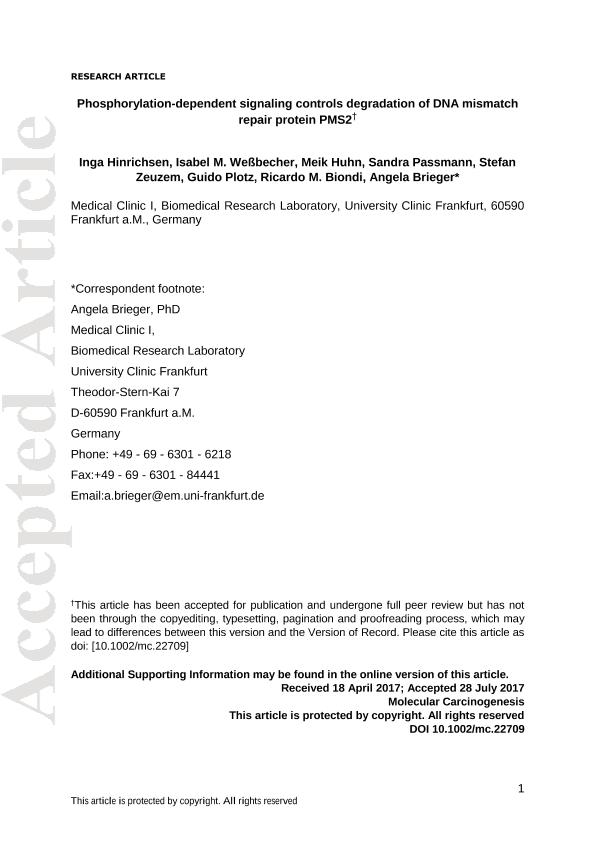Artículo
Phosphorylation-dependent signaling controls degradation of DNA mismatch repair protein PMS2
Hinrichsen, Inga; Weßbecher, Isabel M.; Huhn, Meik; Passmann, Sandra; Zeuzem, Stefan; Plotz, Guido; Biondi, Ricardo Miguel ; Brieger, Angela
; Brieger, Angela
 ; Brieger, Angela
; Brieger, Angela
Fecha de publicación:
12/2017
Editorial:
Wiley-liss, Div John Wiley & Sons Inc
Revista:
Molecular Carcinogenesis
ISSN:
0899-1987
Idioma:
Inglés
Tipo de recurso:
Artículo publicado
Clasificación temática:
Resumen
MutLα, a heterodimer consisting of MLH1 and PMS2, plays an important role in DNA mismatch repair and has been shown to be additionally involved in several other important cellular mechanisms. Previous work indicated that AKT could modulate PMS2 stability by phosphorylation. Still, the mechanisms of regulation of MutLα remain unclear. The stability of MutLα subunits was investigated by transiently overexpression of wild type and mutant forms of MLH1 and PMS2 using immunoblotting for measuring the protein levels after treatment. We found that treatment with the cell-permeable serine/threonine phosphatase inhibitor, Calyculin, leads to degradation of PMS2 when MLH1 or its C-terminal domain is missing or if amino acids of MLH1 essential for PMS2 interaction are mutated. In addition, we discovered that the C-terminal tail of PMS2 is relevant for this Calyculin-dependent degradation. A direct involvement of AKT, which was previously described to be responsible for PMS2 degradation, could not be detected. The multi-kinase inhibitor Sorafenib, in contrast, was able to avoid the degradation of PMS2 which postulates that cellular phosphorylation is involved in this process. Together, we show that pharmacologically induced phosphorylation by Calyculin can induce the selective proteasome-dependent degradation of PMS2 but not of MLH1 and that the PMS2 degradation could be blocked by Sorafenib treatment. Curiously, the C-terminal Lynch Syndrome-variants MLH1L749P and MLH1Y750X make PMS2 prone to Calyculin induced degradation. Therefore, we conclude that the specific degradation of PMS2 may represent a new mechanism to regulate MutLα.
Archivos asociados
Licencia
Identificadores
Colecciones
Articulos(IBIOBA - MPSP)
Articulos de INST. D/INV.EN BIOMED.DE BS AS-CONICET-INST. PARTNER SOCIEDAD MAX PLANCK
Articulos de INST. D/INV.EN BIOMED.DE BS AS-CONICET-INST. PARTNER SOCIEDAD MAX PLANCK
Citación
Hinrichsen, Inga; Weßbecher, Isabel M.; Huhn, Meik; Passmann, Sandra; Zeuzem, Stefan; et al.; Phosphorylation-dependent signaling controls degradation of DNA mismatch repair protein PMS2; Wiley-liss, Div John Wiley & Sons Inc; Molecular Carcinogenesis; 56; 12; 12-2017; 2663-2668
Compartir
Altmétricas



